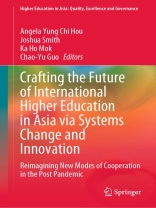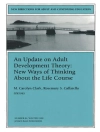The book discusses the most essential topics in understanding the development and changes of higher educational systems in Asia after the outbreak of the pandemic, and explores the transformative, international and innovative moves from an Asian perspective. The topics covered in the book are timely in that higher education in Asia was severely limited during the tumultuous time of the pandemic, including three themes- 1. How the pandemic drives system reform and quality management; 2. How can universities maintain transnational partnerships and attract global talent; 3. How would faculty members innovate teaching pedagogy and reassess student learning experiences.
This timely and well-researched book provides valuable insights into the challenges and opportunities for national, regional, and international higher education created by the recent pandemic as well as technological and geopolitical changes. The lucid analysis of key issues and trends will be useful to academics, policymakers, and researchers within Asia and beyond.
Professor Jane Knight, Ontario Institute for studies in Education, University of Toronto
This book sets out important thinking for the post-pandemic era in Asian higher education. Based on valuable experience across a diverse region, this book highlights the opportunity to reimagine the future trajectory for higher education. As more of the Asia-Pacific moves toward mass and even universal systems of higher education, it exerts greater influence on higher education around the world. This book offers practical analysis that is culturally grounded in the rich civilizations of Asia about ubiquitous issues in higher education, including social equity, human agency, program quality, innovative pedagogy, academic governance, private sector initiative, knowledge building, and a new form of internationalization. It offers a sensible launchpad for a policy agenda.
Professor Gerard Postiglione, Emeritus Professor, The University of Hong Kong
Зміст
Chapter 1. The Impact of COVID-19 Pandemic on Changing Higher Education: Comparative and International Perspectives.- Chapter 2. University as Real Estate Developer: Comparative Perspectives from the Global East.- Chapter 3. Two Edges of Asia in a Multipolar World: The Interconnections between Chinese and Turkish Higher Education Systems.- Chapter 4. Shifting Power and Agency from the College/University to Students.- Chapter 5. The Development of National Information Centers (NICs) with Tokyo Convention: Can the NICs become a key booster for Transnational Higher Education in Asia and Pacific during the Pandemic?.- Chapter 6. Exploring Transnational Research Partnership on A Virtual Mode and The Impacts Of Covid-19 Pandemic–A Longitudinal Research over PIRE Project in Taiwan and US.- Chapter 7. Internationalisation of Malaysian Higher Education in Before, During and Post Covid Era.- Chapter 8. The Impact of the COVID-19 on International Higher Education: The Emerge of New Forms of Internationalization.- Chapter 9. Towards a Paradigm Shift? The Impact of New Geo-politics on Regionalization of Higher Education in Asia.- Chapter 10. Higher Education Intellectual Performance, Social Network, and Strategies over the Pandemic Time: A bio-eco-tech Approach to Online Mathematics Education.- Chapter 11. Pre-service Teachers’ Transformation of Teaching under Covid-19: Feelings, Strategies, and Gains.- Chapter 12. Developing Effective Discourse for Online Learning and Knowledge Creation.- Chapter 13. Innovating Higher Education Assessment amid the COVID-19 Pandemic: A Case Study of Lingnan University, Hong Kong.- Chapter 14. COVID-19 and Well-being of International Students: Implications for International Higher Education Governance.
Про автора
Professor Angela Yung-chi Hou is Associate Dean of College of Education, and Professor of Higher Education of National Chengchi University, Taiwan. She served as Executive Director of Higher Education Evaluation and Accreditation Council of Taiwan from 2016 to 2021, January. She has been actively committed to quality assurance practices and international research for more than 15 years, including serving as Vice President and Board Member of International Network of Quality Assurance in Higher Education (INQAAHE), Vice President and Board Member of Asia-Pacific Quality Network (APQN), and International Reviewer of institutional and program accreditation in several countries, and publishing more than 130 papers in higher education research and quality assurance field.
Professor Joshua Smith concurrently is Visiting Professor, National Chengchi University, Taiwan. He earned his Doctorate in Educational Psychology and Methodology at the University at Albany, State University of New York. Currently, he is Visiting Professor at National Chengchi University. He served as Dean of the School of Education at Loyola University Maryland from 2012-2021. Dr. Smith’s research conducts translational research, partnering with schools and community-based organizations to design, implement, and evaluate educational programs to improve student engagement and organizational effectiveness. Smith has participated in more than 50 grant-funded projects receiving more than $3, 000, 000 in external funding. Honors include the Servant Leader Award, Indiana University Trustees’ Teaching Award, and the National Advising Association’s Outstanding Advising Award.
Professor Joshua Mok Ka-ho is Vice President and concurrently Lam Man Tsan Chair Professor of Comparative Policy of Lingnan University, Hong Kong. Before joining Lingnan, he was Vice President (Research and Development) and Chair Professor of Comparative Policy of The Education University of Hong Kong, and Associate Dean and Professor of Social Policy, Faculty of Social Sciences of The University of Hong Kong. Prior to this, Professor Mok was appointed as Founding Chair Professor in East Asian Studies, and established the Centre for East Asian Studies at the University of Bristol, United Kingdom.Professor Chao Yu Guo is Dean of College of Education and Professor of Department of Education, National Chengchi University, Taiwan. His research is situated in the field of educational administration, school administration, curriculum evaluation, and teaching supervision. He teaches several courses on evaluation and leadership. He is in the service of Editor-in-Chief of
Journal of Education and Psychology and several editorial boards of more than five academically peer-reviewed journals in evaluation. He has made over 20 scholarly contributions, including nearly 50 peer-reviewed research papers. He has also received several important recognitions for his research career.












